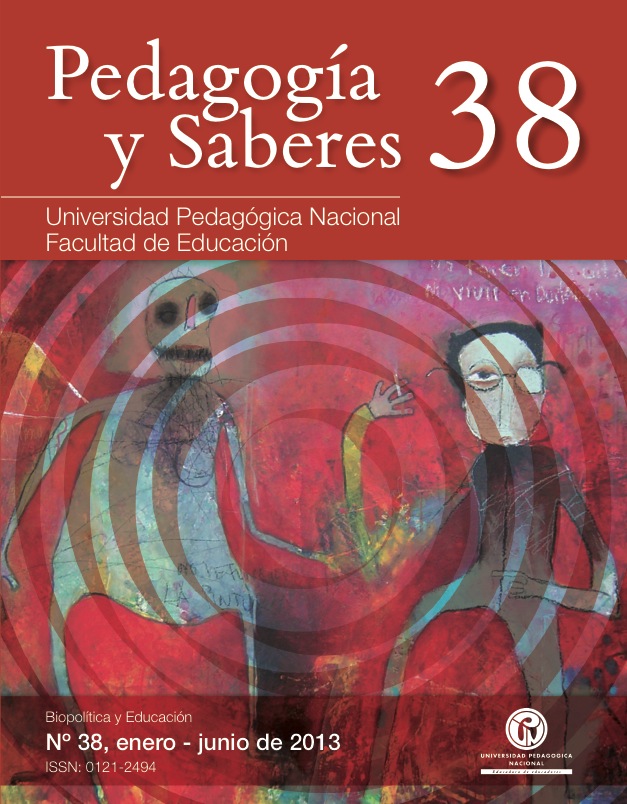Performatividad y fabricaciones en la economía educacional: rumbo a una sociedad performativa
Resumen
Este artículo trata de una discusión sobre la performance y la performatividad en la educación y en la política social. Parte de una concepción de performance como medida de productividad y desempeño y de performatividad como tecnología, cultura y modo de regulación. Busca, entonces, realizar un análisis crítico de las nuevas formas regulativas que derivan se este nuevo discurso de poder. Pretende, además, examinar la existencia de una actitud, de un posicionamiento ético con el cual profesores e investigadores, en los más variados sectores de la educación, se han encontrado; actitud basada en la responsabilización y el emprendedorismo –términos que constituyen, de un lado, parámetros de trabajo y relación social y, de otro, que definen un modo de hacer y un modo de ser.
Citas
Aglietta, M. (1979). A Theory of Capitalist Regulation: The
US Experience. Londres: New Left Books.
Ball, S.J. (1997). Good School/Bad School. British Journal of
Sociology of Education 1(3), 317-36.
Ball, S.J. (1998). Performativity and Fragmentation in
“Postmodern Schooling”. En J. Carter (org.). Postmodernity
and the Fragmentation of Welfare (pp. 187-203).
Londres: Routledge.
Ball, S.J. (1999). Global Trends in Educational Reform and
the Struggle for the Soul of the Teacher. Education
Policy series: Occasional Paper. Chinese University of
Hong Kong.
Baudrillard, J. (1998). The Consumer Society. Londres: Sage.
Bernstein, B. (1996). Pedagogy, Symbolic Control and Identity.
Londres: Taylor & Francis.
Blackmore, J. y Sachs, J. (1997). Worried, Weary and Just
Plain Worn Out: Gender, restructuring and the psychic
economy of higher education. Brisbane: AARE Annual
Conference.
Blackmore, J. y Sachs, J. (1999). Performativity, Passion
and the Making of the Academic Self: Women leaders
in the restructured and internationalized university.
En A. McKinnon y A. Grant, A. (org.). Academic Women.
London: Taylor & Francis
Butler, J. (1990). Gender Trouble. Londres: Routledge.
Corrigan, P. y Sayer, D. (1985). The Great Arch: English
State Formation as Cultural Revolution. Oxford: Basil
Blackwell.
Dean, M. (1994). “A Social Structure of Many Souls”: Moral DOI: https://doi.org/10.2307/3341342
regulation, government, and self formation. Canadian
Journal of Sociology 19(2), 145-68.
De Lauretis, T. (1986). Feminist Studies/Critical Studies: DOI: https://doi.org/10.1007/978-1-349-18997-7
Issues, terms and contexts. En T. De Lauretis (org.).
Feminist Studies/Critical Studies. Bloomington: University
of Indiana Press, 1-19
Deleuze, G. (1992). Postscript on the Societies of Control.
October, 59, 3-7.
Du Gay, P. (1996). Consumption and Identity at Work. Londres: DOI: https://doi.org/10.4135/9781446221945
Sage.
Elliott, J. (1996). Quality Assurance, the Educational Standards
Debate, and the Commodification of Educational
Research. BERA Annual Conference: University of
Lancaster.
Performatividad y fabricaciones en la economía educacional:rumbo a una sociedad performativa / Stepehn Ball
Foucault, M. (1977). Language, Counter-Memory Practice:
Selected Essays and Interviews. Ithaca, NY: Cornell
University Press.
Foucault, M. (1979). Discipline and Punish. Harmondsworth:
Penguin.
Foucault, M. (1980). Two Lectures. Power/Knowledge. Nueva
York: Pantheon Books.
Foucault, M. (1981). The History of Sexuality: An
Introduction. Harmondsworth: Penguin.
Foucault, M. (1983). On the Genealogy of Ethics: An overview
of work in progress. En H. Dreyfus y P. Rabinow
(org.). Michel Foucault: Beyond Structuralism and
Hermeneutics (pp. 229-254). Chicago: University of
Chicago Press.
Foucault, M. (1988). Technologies of the self: A seminar
with Michel Foucault. University of Massachusetts
Press.
Gewirtz, S. y Ball, S.J. (1999). Schools, Cultures and Values:
the impact of the Conservative education reforms in the
s and 1990s in England. ESRC Values and Cultures
project paper. Londres: King’s College London.
Gewirtz, S.; Ball, S.J. y Bowe, R. (1995). Markets, Choice and
Equity in Education. Buckingham: Open University
Press.
Giddens, A. (1991) The consequences of modernity, Polity
Press, Cambridge.
Hacking, I. (1986). Making up People. En T. Heller; M. Sosna
y D. Wellbery. (org.). Reconstructing Individualism:
autonomy, individuality and the self in western thought
(pp. 222-236). Stanford CA: Stanford University Press.
Hanlon, G (1998). Professionalism as Enterprise. Sociology
(1), 43-63.
Jeffrey, B. y Woods, P. (1998). Testing Teachers: The Effect
of School Inspections on Primary Teachers. Londres:
Falmer Press.
Lash, S. y Urry, J. (1994). Economies of Signs and Space.
Londres: Sage.
Lingard, B. y Blackmore, J. (1997). The “Performative” State
and the State of Educational Research (Editorial).
The Australian Educational Researcher 24(3), 1-20.
Lipietz, A. (1985). The Enchanted World, Credit and World
Crises. Londres: Verso.
Lyotard, J.F. (1984). The Postmodern Condition: A Report DOI: https://doi.org/10.2307/1772278
on Knowledge. Minneapolis: University of Minnesota
Press y Mánchester: University of Manchester Press.
McColllow, C. y Lingard, B. (1996). Changing discourses and
practices of academic work. Australian Universities’
Review 39(2), 11-19.
McWilliam, E.; Hatcher, C. y Meadmore, D. (1999). Developing
Professional Identities: Re-making the academic
for corporate time. Queensland: Queensland University
of Technology.
Neave, G. (1988). On the Cultivation of Quality, Efficiency
and Enterprise, an Overview of Recent Trends in Higher
Education in Western Europe 1986–88. European
Journal of Education 23(1), 7-23.
Offe, C. (1984). Contradictions of the Welfare State. Londres:
Hutchinson.
Pignatelli, F. (1993). What Can I do? Foucault on Freedom
and the Question of Teacher Agency. Educational
Theory, Champaign 43(4), 411-32.
Rajchman, J. (1985). Michel Foucault: The Freedom of Philosophy.
Nueva York: Columbia University Press.
Rose, N. (1989). Governing the Soul: The shaping of the
private self. Londres: Routledge.
Rose, N. (1992). Governing the enterprising self. En P.
Heelas y P. Morris (org.). The Values of the Enterprise
Culture. Londres: Routledge.
Rose, N. (1996). Governing “Advanced” Liberal Democracies.
En A. Barry; T. Osborne y N. Rose (org.). Foucault
and Political Reason: Liberalism, neo-liberalism and
rationalities of government (pp. 37-64). Londres: UCL
Press.
Scot, P. (1995). The Meanings of Mass Higher Education.
Buckingham: Open University Press.
Slater, D. (1997). Consumer Culture and Modernity. Cambridge:
Polity Press.
Willmott, H. (1992). Postmodernism and Excellence: The
de-differentiation of economy and culture. Journal of
Organisational Change and Management 5(1), 58-68.
Descargas
Derechos de autor 2014 Pedagogía y Saberes

Esta obra está bajo una licencia internacional Creative Commons Atribución-NoComercial 4.0.






















